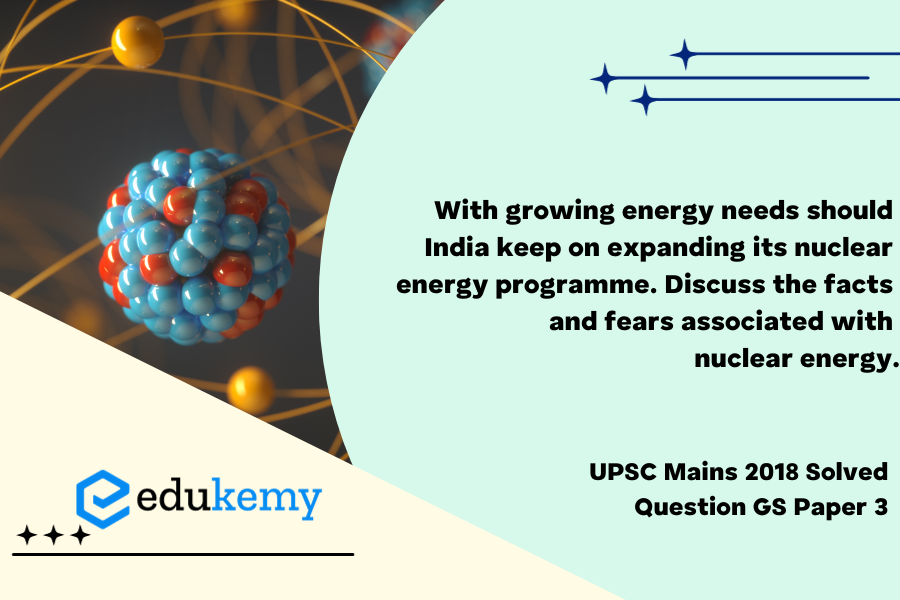With the escalating demand for energy in India, the question of whether to persist with the expansion of the nuclear energy program has become a pivotal and contentious issue. Nuclear energy holds promise as a low-carbon alternative, offering the potential to meet the surging power requirements of the nation. However, this prospect is accompanied by a myriad of facts and fears that shape the discourse around nuclear energy. On the factual front, proponents argue that nuclear power can contribute significantly to India’s energy security, providing a stable and abundant source of electricity. They highlight the relatively low greenhouse gas emissions associated with nuclear energy, positioning it as a cleaner option compared to fossil fuels. Conversely, fears surrounding nuclear energy center on safety concerns, with catastrophic events such as the Chernobyl disaster and Fukushima Daiichi nuclear disaster casting a long shadow. The issue of nuclear waste disposal also looms large, raising questions about the long-term environmental impact and the effectiveness of containment measures. Balancing the potential benefits with these legitimate apprehensions presents a complex challenge for India as it navigates its energy future. This essay will delve into the nuanced landscape of India’s nuclear energy program, exploring both the compelling facts that advocate for its expansion and the genuine fears that demand careful consideration in shaping the nation’s energy policy.
Tag: Infrastructure: energy, ports, roads, airports, railways etc.
Contents
Decoding the Question:
- In Intro, try to give the current scenario of energy demand with use of data and nuclear energy production in the country.
- In Body,
- Justify expansion of nuclear energy.
- Discuss facts and fears associated with nuclear energy.
- In Conclusion, try to mention steps taken by the government in the nuclear energy sector and resultant benefit to India.
Answer:
As per International Energy Agency, India’s energy demand will increase more than that of any other country over the next two decades. It forecasted India overtaking the European Union as the world’s third-largest energy consumer by 2030. As per World Nuclear Association, Nuclear energy constitutes only 2.4% of India’s total energy basket, which shows the need to improve use of nuclear energy for fulfilling growing demand.
With 6700 MW capacity under installation, nuclear energy currently provides 3% of India’s energy needs. It is projected by the Department of atomic energy that by 2050, 20-30 percent of Indian energy needs will be provided by nuclear energy.

Reasons why India needs to expand its nuclear energy programme:
- Fossil Fuel Dependence: With huge dependence on imported oil and associated foreign exchange payments, nuclear energy can reduce fossil fuel dependence.
- Environment Friendly: Being low on CO2 emissions, nuclear technology helps in checking climate change thereby helping realizing India’s Nationally Determined Contributions to UNFCCC.
- Strategic Benefits: With improved technological development and acceptance as a responsible nuclear state, India will become part of the global nuclear trade regime and also rightfully gain position in the Nuclear Suppliers Group (NSG).
- Economic Dependence: Reduced per unit cost with technological development and realization of thorium-enabled production cycle.
- Agreements: Strategic position as India partnered many countries in bilateral and multilateral agreements. (e.g. 123-USA, Reactor sully – France, Russia, Fuel Supply – Canada, Australia).
Facts and fears associated with Nuclear Energy:
Though nuclear energy is considered a clean and sustainable source of energy, there are certain fears and issues which need to be addressed. These can be summed up as follows:
- Lower Public Awareness: Commercial nuclear power is sometimes viewed by the general public as a dangerous or unstable process. This perception is often based on three global nuclear accidents, its false association with nuclear weapons, and how it is portrayed on popular television shows and films. In India, the Jaitapur Nuclear Power Project , which will be India’s biggest nuclear energy park, is facing opposition from the local population.
- Issues of used fuel transportation, storage, and disposal: Many people view used fuel as a growing problem and are apprehensive about its transportation, storage, and disposal. In the Koodankulam nuclear power project, this issue of disposal of nuclear waste has been seen.
- Issues of local community: People living in coastal areas are strongly opposing nuclear energy projects because they fear loss of fish and other livelihood opportunities. Hot water released from nuclear power plants will destabilize ocean water configuration.
- Loss and Damage: Nuclear accidents are feared in nuclear power plants and its surrounding areas for the compensation aspect to the affected people. The controversies surrounding the civil nuclear liability act is an example of loss and damage.
- Land acquisition: To build nuclear reactors, large areas of land are needed. Land acquisition and relocation of local people is a major issue in any developmental activity and this is true for nuclear power plant related land acquisition as well.
Conclusion
With the Indian motto of ‘atoms for peace’, nuclear energy can act as a great catalyst for inclusive growth and development by providing much needed energy security, so that India should continue to expand its nuclear energy program. To fulfill growing energy demand and economic growth and development, India needs to invest more in nuclear energy sector development along with a pragmatic approach and proper environmental and social impact assessment.
In case you still have your doubts, contact us on 9811333901.
For UPSC Prelims Resources, Click here
For Daily Updates and Study Material:
Join our Telegram Channel – Edukemy for IAS
- 1. Learn through Videos – here
- 2. Be Exam Ready by Practicing Daily MCQs – here
- 3. Daily Newsletter – Get all your Current Affairs Covered – here
- 4. Mains Answer Writing Practice – here


